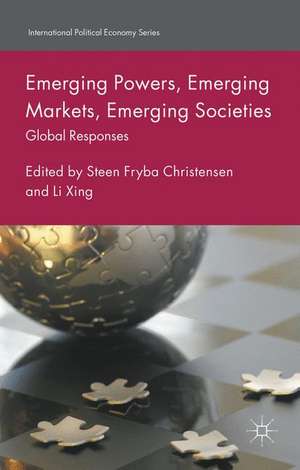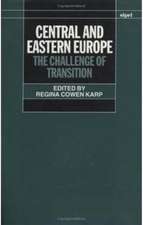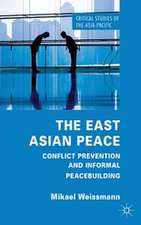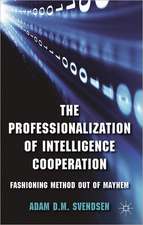Emerging Powers, Emerging Markets, Emerging Societies: Global Responses: International Political Economy Series
Editat de Steen Fryba Christensen, Li Xingen Limba Engleză Hardback – 18 feb 2016
Din seria International Political Economy Series
- 20%
 Preț: 751.82 lei
Preț: 751.82 lei -
 Preț: 430.59 lei
Preț: 430.59 lei -
 Preț: 147.23 lei
Preț: 147.23 lei - 17%
 Preț: 363.47 lei
Preț: 363.47 lei - 17%
 Preț: 490.23 lei
Preț: 490.23 lei -
 Preț: 428.68 lei
Preț: 428.68 lei - 9%
 Preț: 762.79 lei
Preț: 762.79 lei - 20%
 Preț: 690.96 lei
Preț: 690.96 lei - 20%
 Preț: 627.54 lei
Preț: 627.54 lei - 20%
 Preț: 566.63 lei
Preț: 566.63 lei - 15%
 Preț: 644.30 lei
Preț: 644.30 lei -
 Preț: 389.11 lei
Preț: 389.11 lei -
 Preț: 385.08 lei
Preț: 385.08 lei - 15%
 Preț: 644.30 lei
Preț: 644.30 lei -
 Preț: 389.31 lei
Preț: 389.31 lei -
 Preț: 413.84 lei
Preț: 413.84 lei -
 Preț: 387.38 lei
Preț: 387.38 lei - 15%
 Preț: 638.89 lei
Preț: 638.89 lei - 15%
 Preț: 644.63 lei
Preț: 644.63 lei - 18%
 Preț: 893.71 lei
Preț: 893.71 lei -
 Preț: 412.47 lei
Preț: 412.47 lei -
 Preț: 325.08 lei
Preț: 325.08 lei -
 Preț: 395.47 lei
Preț: 395.47 lei - 15%
 Preț: 641.85 lei
Preț: 641.85 lei -
 Preț: 391.40 lei
Preț: 391.40 lei -
 Preț: 392.60 lei
Preț: 392.60 lei -
 Preț: 388.34 lei
Preț: 388.34 lei - 15%
 Preț: 640.55 lei
Preț: 640.55 lei -
 Preț: 389.70 lei
Preț: 389.70 lei - 15%
 Preț: 646.30 lei
Preț: 646.30 lei - 15%
 Preț: 637.78 lei
Preț: 637.78 lei - 15%
 Preț: 643.84 lei
Preț: 643.84 lei -
 Preț: 386.99 lei
Preț: 386.99 lei - 15%
 Preț: 641.53 lei
Preț: 641.53 lei -
 Preț: 386.81 lei
Preț: 386.81 lei - 15%
 Preț: 639.73 lei
Preț: 639.73 lei - 18%
 Preț: 944.19 lei
Preț: 944.19 lei -
 Preț: 391.40 lei
Preț: 391.40 lei -
 Preț: 330.65 lei
Preț: 330.65 lei -
 Preț: 394.12 lei
Preț: 394.12 lei -
 Preț: 386.99 lei
Preț: 386.99 lei -
 Preț: 386.81 lei
Preț: 386.81 lei - 15%
 Preț: 634.68 lei
Preț: 634.68 lei -
 Preț: 387.75 lei
Preț: 387.75 lei - 15%
 Preț: 641.53 lei
Preț: 641.53 lei - 15%
 Preț: 640.06 lei
Preț: 640.06 lei - 15%
 Preț: 643.16 lei
Preț: 643.16 lei - 15%
 Preț: 642.68 lei
Preț: 642.68 lei - 15%
 Preț: 641.85 lei
Preț: 641.85 lei - 15%
 Preț: 637.13 lei
Preț: 637.13 lei
Preț: 586.38 lei
Preț vechi: 689.86 lei
-15% Nou
Puncte Express: 880
Preț estimativ în valută:
112.23€ • 116.73$ • 94.05£
112.23€ • 116.73$ • 94.05£
Carte tipărită la comandă
Livrare economică 13-27 martie
Preluare comenzi: 021 569.72.76
Specificații
ISBN-13: 9781137561770
ISBN-10: 1137561777
Pagini: 277
Ilustrații: XIII, 277 p.
Dimensiuni: 140 x 216 x 18 mm
Greutate: 0.49 kg
Ediția:1st ed. 2016
Editura: Palgrave Macmillan UK
Colecția Palgrave Macmillan
Seria International Political Economy Series
Locul publicării:London, United Kingdom
ISBN-10: 1137561777
Pagini: 277
Ilustrații: XIII, 277 p.
Dimensiuni: 140 x 216 x 18 mm
Greutate: 0.49 kg
Ediția:1st ed. 2016
Editura: Palgrave Macmillan UK
Colecția Palgrave Macmillan
Seria International Political Economy Series
Locul publicării:London, United Kingdom
Cuprins
PART I: INTRODUCTION AND THEORETICAL DISCUSSION
1. The Emerging Powers and the Emerging World Order: Back to the Future?; Steen Fryba Christensen; Li Xing
2. From "Hegemony and World Order" to "Interdependent Hegemony and World Reorder"; Li Xing
3. BRICS and Capitalist Hegemony: Passive Revolution in Theory and Practice; Ian Taylor
PART II: THE GLOBAL SOUTH
4. How Prioritized is the Strategic Partnership between Brazil and China?; Steen Fryba Christensen
5. India as an 'Emerging power' in the Global Order on Geopolitics and Geoeconomics; Jørgen Dige Pedersen
6. Situating the Gulf States in the Global Economic Redrawing: GCC-BICs Relations; Crystal A. Ennis
7. BRICS in Africa and Underdevelopment: How Different?; Ian Taylor
8. Reconfiguring Political Alliances and the Role of Swing States: The Strategy of Bolivia and its Relations with the BRICS; Óscar García Agustín
PART III: EUROPE
9. A Small State Maneuvering in the Changing World Order: Denmark's 'Creative Agency' Approach for Engagement with the BRICs; Camilla T. N. Sørensen
10. New Tourists at Old Destinations: Chinese Tourists in Europe; Karina Madsen Smed; Ane Bislev
CONCLUSION
11. Emerging Powers, Emerging Markets, Emerging Societies: Global Responses; Steen Fryba Christensen; Li Xing
1. The Emerging Powers and the Emerging World Order: Back to the Future?; Steen Fryba Christensen; Li Xing
2. From "Hegemony and World Order" to "Interdependent Hegemony and World Reorder"; Li Xing
3. BRICS and Capitalist Hegemony: Passive Revolution in Theory and Practice; Ian Taylor
PART II: THE GLOBAL SOUTH
4. How Prioritized is the Strategic Partnership between Brazil and China?; Steen Fryba Christensen
5. India as an 'Emerging power' in the Global Order on Geopolitics and Geoeconomics; Jørgen Dige Pedersen
6. Situating the Gulf States in the Global Economic Redrawing: GCC-BICs Relations; Crystal A. Ennis
7. BRICS in Africa and Underdevelopment: How Different?; Ian Taylor
8. Reconfiguring Political Alliances and the Role of Swing States: The Strategy of Bolivia and its Relations with the BRICS; Óscar García Agustín
PART III: EUROPE
9. A Small State Maneuvering in the Changing World Order: Denmark's 'Creative Agency' Approach for Engagement with the BRICs; Camilla T. N. Sørensen
10. New Tourists at Old Destinations: Chinese Tourists in Europe; Karina Madsen Smed; Ane Bislev
CONCLUSION
11. Emerging Powers, Emerging Markets, Emerging Societies: Global Responses; Steen Fryba Christensen; Li Xing
Notă biografică
Steen Fryba Christensen is Senior Researcher at the Research Center on Development and International Relations, Department of Culture and Global Studies, Aalborg University, Denmark. His research focuses particularly on Brazil, Latin America and current world order dynamics with a focus on emerging powers.
Li Xing is Professor and Director of the Research Center on Development and International Relations, Department of Culture and Global Studies, Aalborg University, Denmark. His research and teaching areas are IR, IPE and development studies. His recent research focus is the rise of China/emerging powers vis-a-vis the existing world order.
Li Xing is Professor and Director of the Research Center on Development and International Relations, Department of Culture and Global Studies, Aalborg University, Denmark. His research and teaching areas are IR, IPE and development studies. His recent research focus is the rise of China/emerging powers vis-a-vis the existing world order.
Textul de pe ultima copertă
The rise of emerging or new powers has recently become one of the most researched areas in International Relations. While most studies focus on relations between traditional and emerging powers, this edited collection turns the focus 180 degrees and asks how countries outside these two power sets have reacted to the emerging new world order. Are emerging powers creating a united front in a struggle to change the global order, or are they more concerned with national interests? Are we seeing major changes in the global order, or simply an adjustment by the traditional powers to the emergence of new contenders? In order to the answer these questions, the authors take a broad thematic approach in analyzing recent trends in the interplay between states, markets and societies, concentrating in particular on Latin America, Africa, the Middle East and Europe, and on the three major emerging powers: China, India and Brazil.
















